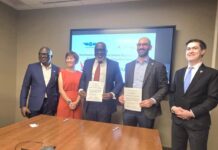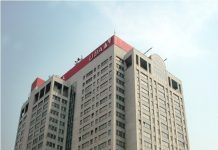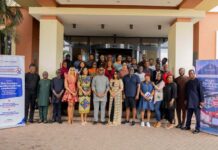Crisis is brewing in the senate over alleged marginalisation of some lawmakers in the sharing of N50 billion constituency projects fund.
It was gathered that grumbling began when a document on project funding became public showing that some 15 privileged senators who are predominantly principal officers, got a chunk of the additional N50 billion earmarked for constituency projects in the Ministries, Departments and Agencies (MDAs).
There were also other projects inserted into the bloated budget to benefit some unnamed lawmakers.
The document revealed that funds earmarked for constituency projects of some lawmakers were different from the statutory N100 billion captured in the budget.
According to The Guardian, over N50 billion worth of capital projects accrued to the lawmakers from the N264 billion increase effected by the two chambers of the national assembly when the budget figure was raised from N10.330 trillion to N10.594 trillion.
Among the main areas of contention is the N1. 8 billion worth of projects spread across Yobe North Senatorial District which the Senate President, Ahmad Lawan, represents in the Senate.
The projects include the N900 million appropriated for the construction of rural roads at Fadawa and some selected local government areas within Yobe North senatorial zone, and the N475 million for procurement of farm implements and accessories in the same Yobe North district.
Others are the allocation of N143 million for the construction of six culverts and drains in Karasuwa and Jakusko local council, Yobe State; N144 million for the construction of six culverts and drains in Bade and Yusufari local councils, Yobe State; and another N143 million for the construction of six culverts and drains in Nguru and Machina local councils, Yobe State.
The senator representing Lagos West, Mr. Solomon Olamilekan, got N1 billion for “empowerment, training in boat operations and fishing for rural fishermen” in his senatorial district, particularly for Badagry, Ojo, Amuwo-Odofin, Ifako, Ijaiye and Agege areas.
Also causing trouble is the allocation of N700 million for the installation of all-in-one solar powered street lights across the eight local government areas of Delta Central Senatorial District, namely Ughelli North, Ughelli South, Ethiope East, Ethiope West, Udu, Okpe, Sapele and Uvwie,” represented by the deputy senate president, Mr. Ovie Omo-Agege, represents.
Similarly, N500 million was appropriated for “Grants to youths and women in IDP camps” in Borno Central Senatorial District, which is represented by former governor, Mr. Shettima Kassim.
In Gombe North Senatorial District represented by Saidu Alkali, N560 million was appropriated for projects, including the N100 million for “empowerment of youths and women, purchase of motorcycles, sewing machines, refrigerators and grinding machines, as well as the N460 million for the construction of maternity clinic and purchase of hospital equipment.”
That was followed by the allocation of another N400 million for training and support of civilian JTF in Jere/MMC/KAGA federal constituencies of Borno State.
In Nasarawa West District which Abdullahi Adamu represents, projects worth N600 million were allocated, including N500 million for the provision of motorised boreholes; N120 million for the construction of 12-kilometre rural road from Shabuagwada junction to Barkinogishabu and another N500 million for the provision of farm implements and input to farmers.
Other projects in Nasarawa West are N500 million for training and empowerment of youths and women in various agricultural value chains; N100 million for the provision of solar street lights across communities in Keffi; and the N200 million for the provision of agricultural equipment for farmers.
Among other contentious allocations is the N300 million for vocational training and provision of empowerment materials for youths and women in Lagos central district represented in the senate by Mrs. Oluremi Tinubu.
It was also learnt that some projects were inserted to benefit some unnamed persons.
“They include N1 billion for the construction of rural roads; N468. 4 million for federal government support for women in agribusiness; and N554.3 million federal government support for youths in agribusiness; N1.15 billion for the provision and installation of solar street light nationwide.”
Other such projects were listed as the N500 million for the supply of laptops and writing materials to secondary schools in Borno State; N500 million for the construction of classrooms in primary schools in Zarawuyaku and Fikayel; N500 million for the supply of instructional materials to various schools in northeast; and N500 million for the renovation of selected primary and secondary schools in northeast.
But the senate insisted by passing the 2020 budget the way it was, it had met its obligations.
Spokesman for the senate, Mr. Godiya Akwashiki, insisted that by facilitating the return of the budget to January-December circle, the Senate deserved commendation.
Akwashiki said that the ninth assembly, by this feat, had demonstrated that they were out to better the lives of Nigerians, stressing that the January-December budget circle would in no doubt offer the executive arm the opportunity for a full implementation.
In a response to questions on the crisis being generated by the alleged lopsided distribution of the projects, Akwashiki said: “What I know is the N100 billion constituency development projects funds from where the senate got N40 billion while the House of Representatives got N60 billion.”
He said he could not defend allegations of some insertions made by the national assembly into the budget.
“I don’t know whether other insertions were made to the budget because I am not a member of the appropriation committee. I’m hearing this for the first time. It may be true and it may be false because the chances of senators inserting projects into the budget are 50 per cent, and the chances of saying it is not true are also 50 per cent. As it is now, the budget has not been signed into law. The proposal came from the executive and it would still be scrutinised by the executive.
“The senate committee on appropriation told us that they discovered additional revenue which was not captured and decided to apply it to some departments and ministries. That was the explanation they gave for the increment in the size of the budget,” he added.























































